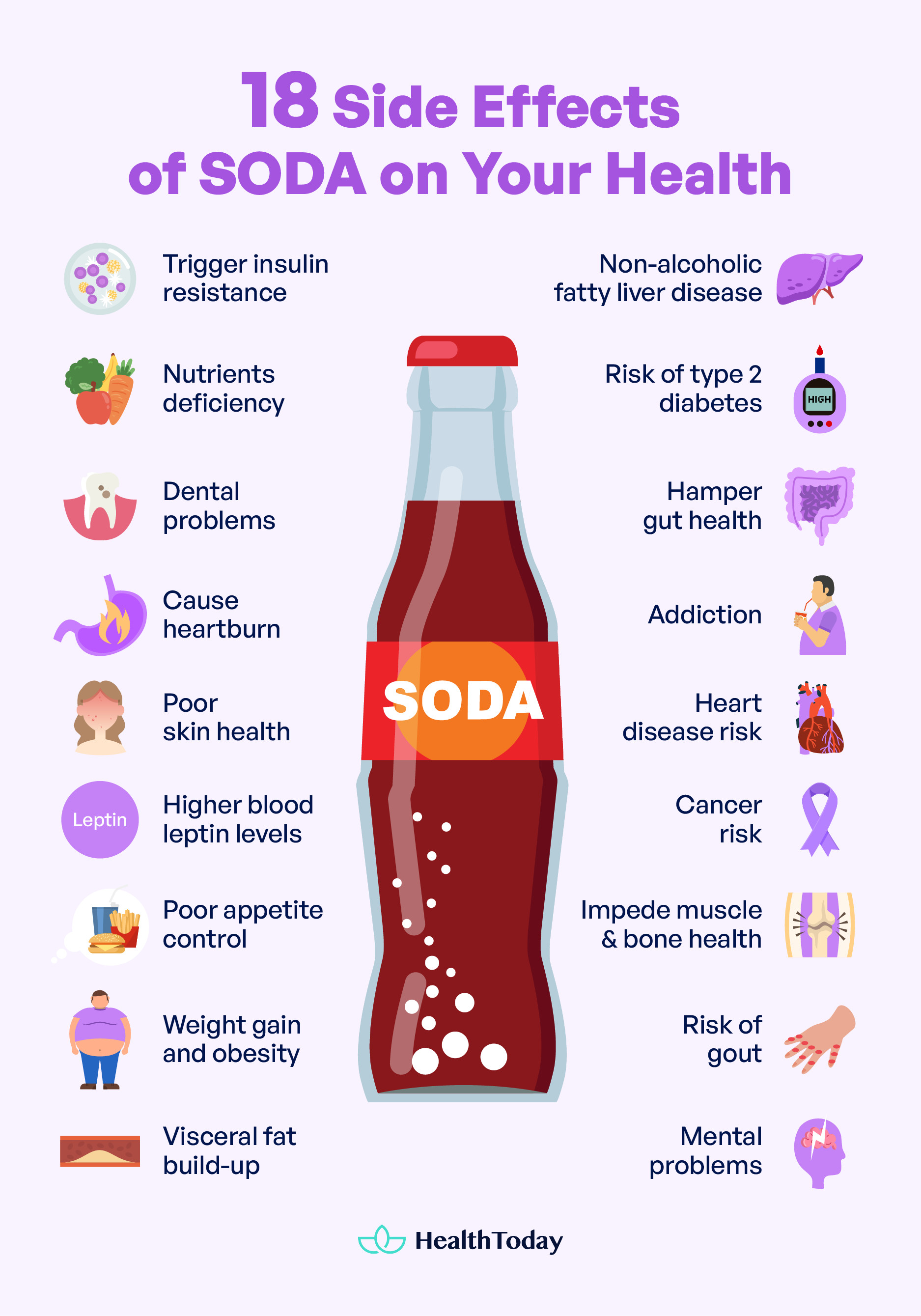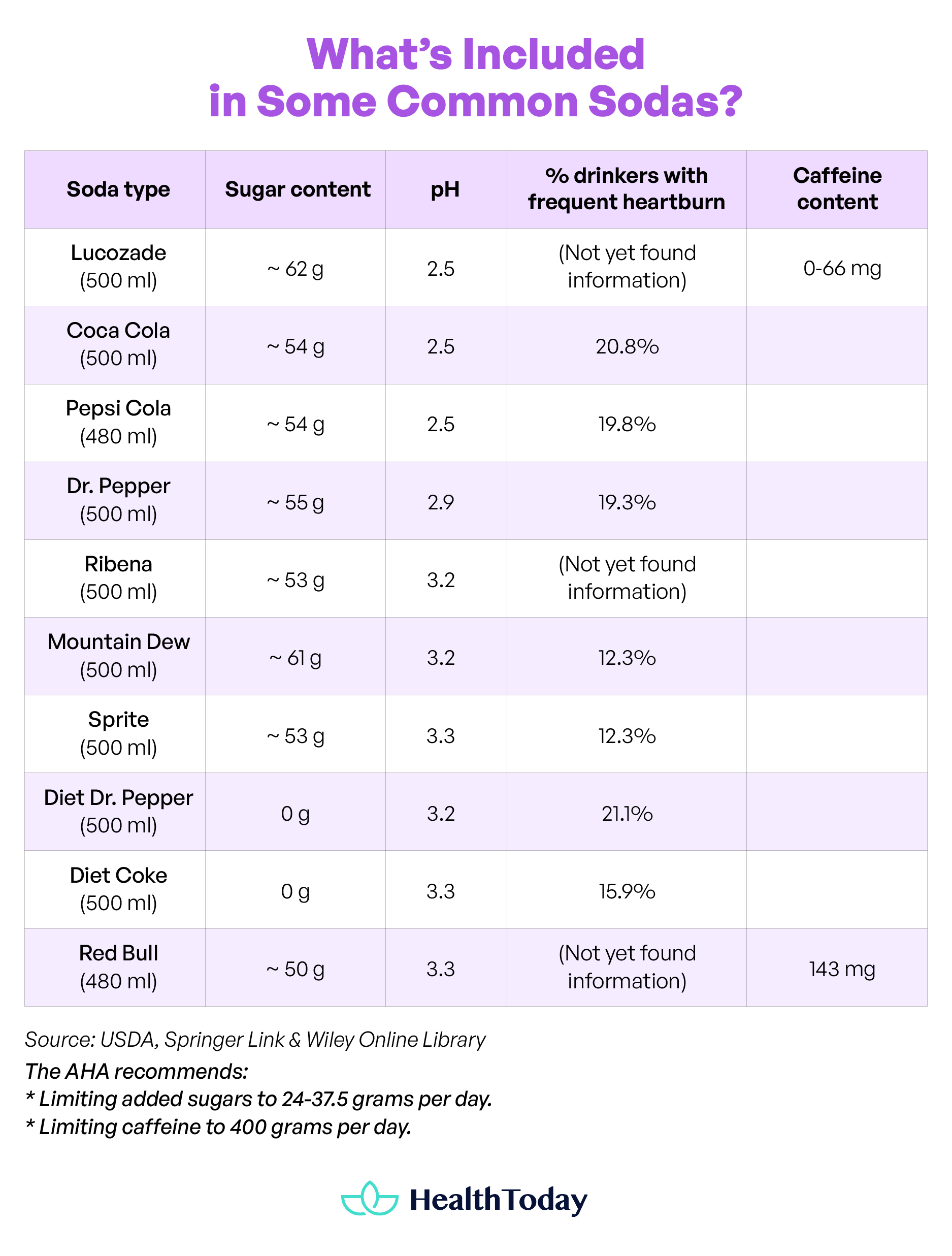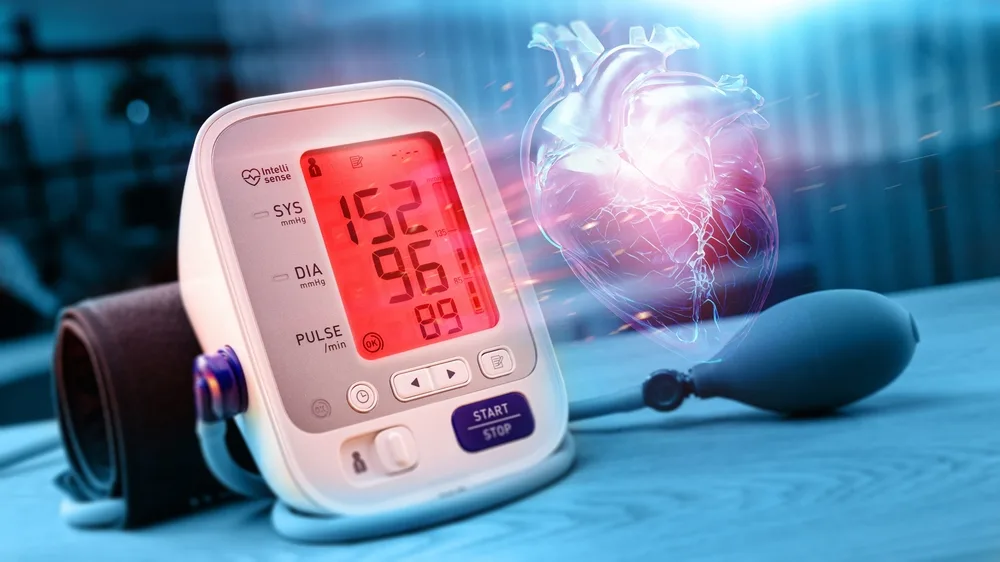Table of Contents
Soda ads have long bombarded us with million-dollar campaigns, jumbo portions, or free refills.
Drinking pop is tempting, with its sweet taste and fizzy bubbles. However, the potential side effects of soda have long been a matter of concern. Get ready for surprising insights into why is soda bad for you?
How does soda affect your body and why you should quit drinking
Is drinking soda bad for you? According to the Centers for Disease Control and Prevention (CDC), the harmful effects of soft drinks on the human body – as with other sugary drinks, include weight gain/obesity, non-alcoholic fatty liver disease, type 2 diabetes, heart and kidney disease, tooth decay/cavities, and gout (1).
Our diet consists of various sources of sugars, some worse than others, but sugar-sweetened beverages (SSBs) are the worst. Sugary drinks include regular (i.e., not sugar-free) soda, fruit juice, sports/energy drinks, coffee, and tea. SSBs are the leading source of added sugars in the American diet—soft drinks account for 25% (1, 2).
Soda used to mean plain carbonated water. But now it is sugary and flavored, and its composition includes (3):
- Sugar: usually either sucrose (composed of simple sugars glucose and fructose) or high fructose corn syrup (HFCS).
- Other sweeteners: natural – stevia or synthetic – aspartame, acesulfame potassium, saccharin, cyclamate, and sucralose
- Acid: phosphoric acid (commonly used in cola), citric, or malic acids to give a tangy or sour taste
- Flavorings and colorings: ethanol or others as solvents for aroma substances as a flavoring and carotenoids, anthocyanins, fruit juice concentrate, and caramel as colorings
- Preservatives: traditionally benzoic and sorbic acids, added as sodium or potassium salts. Carbon dioxide can also act as a preservative.
- Some products may contain small amounts of vitamins, minerals, and herbal extracts.
These added ingredients can give rise to multiple health concerns.

1. Trigger insulin resistance
Insulin is a hormone produced by the pancreas to help transport glucose (a simple sugar) from digested food into cells for energy. This process helps control and stabilize your blood glucose levels. When you consume excess amounts of sugar over time, your cells may become less sensitive or even resistant to the effects of insulin. Your pancreas, then, has to produce extra insulin to manage glucose (4).
The American Heart Association (AHA) recommends restricting our daily added sugar consumption as follows (5):
- Women: Six teaspoons (25 grams or 100 calories)
- Men: Nine teaspoons (37.5 grams or 150 calories)
- Ages 2‒18 years: Less than six teaspoons
- Under two years of age: added sugars should not be included in the diet
However, a 500 ml bottle of soda often contains over 50 grams of sugar (6).
A 3-week study found that moderate amounts of fructose or sucrose (40 g/day) can trigger insulin resistance significantly compared to similar amounts of glucose (7).
Type 2 diabetes and other chronic metabolic diseases often follow insulin resistance, as the role of insulin extends beyond the control of sugar alone (8, 9).
2. Nutrient deficiency
Soda provides little to no nutritional value, yet its sugar content quickly adds calories to your diet. Each gram of sugar means four extra calories (6, 10).
Soda drinkers typically follow a less healthy diet—with soda replacing nutritious options such as milk, vitamins, calcium, fruits, and dietary fiber (10, 11). People who drink soda may also consume more energy and fat (12).
3. Dental problems
Sodas have long been a dental concern, especially in children and teenagers (10, 13). An oral pH below 5.5 signals enamel erosion, and soft drinks typically have a pH range of 2.5 to 3.5 (10).
The presence of sugar worsens the damage. Sugar allows oral bacteria to grow and produce acid that can weaken enamel and result in tooth decay (14, 15, 16).
In a study, children aged 3 to 5 years who switched from consuming minimal soda to a high intake over two years experienced a 75% rise in tooth decay, missing teeth, and fillings compared to those who continued to consume less soda (15).
Consuming soda before bedtime can be hard on your teeth. Swishing it around your mouth can lower pH levels further. To minimize harm, use a straw and wait an hour before brushing your teeth (10, 13).
4. Does soda cause heartburn?

Sodas are among the most acidic modern drinks. This acidity can worsen digestive problems like gastroesophageal reflux disease (GERD, or acid reflux), dyspepsia, and bloating (17, 18).
Carbonated drinks can lower esophageal pH to less than 4, leading to GERD-like symptoms (17, 19). Heartburn is a classic GERD symptom—a burning sensation that starts in your chest and crawls up to your throat (20).
In a study, 10%‒19.8% of participants reported experiencing heartburn after drinking different carbonated drinks (21).
5. Poor skin health
A study with 8197 students found a link between frequent consumption of carbonated sodas (seven times a week or more) and a higher risk of moderate-to-severe acne. Moreover, students with a daily sugar intake exceeding 100 grams have 3.12 times higher odds of moderate-to-severe acne compared to those with lower sugar intake (22).
With its high sugar content, soda can quickly raise blood sugar levels. This increase can result in dry, itchy skin due to poor blood flow and frequent urination (23).
Also, those with insulin resistance, closely linked with soda intake, might develop acanthosis nigricans, causing dark, velvety skin patches in body creases (23).
6. Higher blood leptin levels
Leptin, an appetite-regulating hormone produced by fat cells within the body, regulates your body weight in the long run.
It does so by conferring feelings of satiety and fullness and increasing energy expenditure. The blood levels of leptin correspond to the amount of adipose tissue (fat) in the body. Hence, with food intake, when fat increases, leptin production also goes up (24, 25).
Studies reveal that daily consumption of sugary drinks can also raise leptin production. Increased blood leptin levels, in turn, can lead to leptin resistance (25, 26).
Leptin resistance causes increased hunger (i.e., reduced satiety), over-consumption of nutrients, and increased body mass. This makes weight loss challenging and causes inflammation. There is also an increased risk of metabolic syndromes (24, 25, 27).
In animal studies, excessive fructose, the primary sugar in soda, induced leptin resistance. However, this resistance could be reversed when sugar intake was discontinued (28, 29).
7. Poor appetite control
Despite being aware of the health hazards, a considerable number of teenagers continue to consume sugary drinks regularly (30).
Unlike solid foods with similar ingredients, however, sugary drinks fail to provide a sense of fullness (31, 32), which is concerning because you will only eat more later.
Apart from the deranged leptin levels, the culprits are glucose and fructose—associated with decreased blood flow to brain regions involved in appetite control (33). These sugars can also trigger cravings for sugary snacks and unhealthy fats (10, 34).
8. Weight gain and obesity
Consumption of sugary soft drinks correlates with weight gain and obesity (10, 35).
A 350-ml can of sugary soda daily can lead to a weight gain of about 6.75 kg within a year in an adult (10, 36).
Another study found that women who increased their intake of sugary beverages from one or fewer drinks per week to one or more per day gained around 4.2‒4.7 kg over four years. However, those with reduced intake had only a 0.15-1.34 kg weight increase (37).
9. Visceral fat build-up
Excess fructose can cause a dangerous amount of fat to build up around your organs—the liver, stomach, and intestines. This fat is called visceral or belly fat (38, 39, 40).
In a 6-month study, regular cola drinkers had higher relative changes in visceral fat (24‒31%) than people who drink milk, diet cola, or water (41). Visceral fat induced by soda consumption increases the risk of type 2 diabetes and heart disease (41, 42).
10. Non-alcoholic fatty liver disease
People have been more exposed to fructose over the past few decades, owing to the increased availability and consumption of various sodas and sweet treats containing sucrose or high fructose corn syrup (HFCS). Fructose is metabolized primarily within the liver. (38). Increased flux of fructose directed towards your liver impairs glucose metabolism and contributes to insulin resistance and the build-up of new fat (8).
The built-up fat gets transported as triglycerides within lipoproteins in the blood or remains in your liver—steatosis. Excess fat can trigger inflammation, stress -steatohepatitis and induce liver damage that can progress over time to cirrhosis and liver cancer (38, 43).
A 6-month study found that regular cola consumers had 132‒143% more liver fat from baseline, significantly higher than those drinking milk, diet cola, or water (41).
11. Risk of type 2 diabetes
Weight gain and insulin resistance are major risk factors for type 2 diabetes (10).
A 2010 study assessing previous literature showed that those who drank the most sugary drinks (1–2 servings per day) had a 26% higher risk of developing type 2 diabetes when compared to those consuming none or less than a serving per month (9, 37). Another study shows a 25% higher risk in consumers in the top quartile compared to the bottom (44).
Analyzing data on diabetes rates in 175 countries, researchers found that with each additional 150 kcal of sugar consumed daily (equivalent to one can of soda), type 2 diabetes rates increased by 1.1% (45). For example, if every person in the US drinks one can of soda daily, it would lead to 3.6 million more cases of type 2 diabetes.
12. Hamper gut health
Fructose can affect gut function by releasing fats, pro-inflammatory cytokines (a small protein), and uric acid into the bloodstream (38). Excess fructose can also negatively alter the balance of gut microbiota (bacteria in the gut), such as reducing diversity and increasing harmful bacteria (38, 43).
This imbalance leads to the passage of harmful substances through the gut lining, causing inflammation and weakening your immunity (38, 43).
13. Addiction
Having a sweet tooth or sugar cravings is not just about the taste but can be a psychological or physiological addiction (46).
Addictive substances, including hard drugs, increase the feel-good dopamine in the brain. Sugar-containing foods, when tested in rats, trigger a similar dopamine response, contributing to sugar dependency (47, 48).
While proving full-scale addiction in humans is complex, the consumption patterns of sugary drinks often resemble those of addictive substances, marked by cravings, tolerance, and dependence/withdrawal (46, 49).
14. Heart disease risk
In a recent study, Australian teenagers showed higher awareness (71.7‒75.6%) of the possible effects of soda on the human body, like tooth decay, weight gain, and diabetes, but lower awareness of the link of soda consumption to heart disease (56.0%) and cancer (19.3%) (50).
Studies reveal that those who eat more sugar have lower levels of good cholesterol and higher levels of bad cholesterol and triglycerides, causing dyslipidemia, which increases your risk of cardiovascular disease (8, 39, 51).
Drinking sugary drinks regularly can increase blood sugar and blood pressure (52), which are associated with a higher risk of coronary heart disease (CHD) and stroke (53, 54, 55).
A 22-year follow-up study of over 40,000 men discovered that each additional serving (standard 355 ml [12oz] serving – a glass, can, or bottle) of sugar-sweetened beverage increased the risk of CHD by 19% to 25% (56).
15. Cancer risk
Cancer frequently coexists with chronic diseases like obesity, type 2 diabetes, and heart disease. Thus, not surprisingly, sodas are linked to an elevated risk of cancer (57).
Drinking 100 mL of sugary drinks per day is linked with an 18% greater risk of developing cancer—of any type (57, 58). If you drink over two servings a day, it could raise:
- 87% of the risk of pancreatic cancer (59).
- 78% of the risk of type I endometrial (inner uterus lining) cancer (60).
- 67% of the risk of cancer return (after treatment) or dying from cancer (61).
People who consume sugar-sweetened soda five or more times per week are at 85% higher risk of breast cancer mortality when compared to those who rarely or never drink (62).
16. Impede muscle and bone health
A diet high in fructose can lead to sarcopenia, in which muscles shrink and lose strength due to protein changes and inflammation (38).
In animal studies, two months of drinking coke decreased bone density. This is because the phosphoric acid in soda depletes calcium, leading to increased bone breakdown to replete blood calcium (10, 63).
Long-term soda consumption has been tied to a heightened risk of fractures (63). In an analysis of postmenopausal women, each additional serving of soda/day is linked to a 14% higher risk of hip fractures, regardless of soda type (regular or diet) and caffeine content (64).
17. Risk of gout
Gout is a form of arthritis (joint inflammation—commonly in the big toe) that presents acutely as intense pain, redness, warmth, and swelling. Gout commonly occurs due to elevated blood uric acid levels (65).
Fructose is the main carbohydrate that increases uric acid production (32, 38, 66).
According to a 12-year study, one sugary drink serving per day increases the risk of gout by 45% compared to less than one serving per month, and two or more servings per day increases the risk by 85% (32, 67).
18. Mental problems
High sugar intake from soda can raise the risk of anxiety, stress, and even dementia.
A study found that teenagers who drank carbonated soft drinks three or more times a day were up to 55% more likely to have stress-related sleep problems than those who consumed once a day or less (68).
In another study, children who drank one or more sodas per day were linked to more aggressive behaviors than those who did not. In contrast, those drinking four or more sodas per day had higher scores for attention problems (69).
Moreover, soft drinks might be linked to violence, depression, suicidal thoughts, and attempted suicide (12, 70). Studies have suggested that even slight increases in blood sugar levels are associated with a greater risk of dementia, particularly Alzheimer’s type (71, 72).
What happens when you drink too much soda? Symptoms you should know
It is OK to enjoy soda occasionally, but more than one serving a day is considered too much.
Symptoms of going overboard
What happens if you drink too much soda? Chronic diseases might not appear overnight (73), but your regular dietary behaviors influence the risk of developing these disorders. Thus, you might notice mass changes only over time.
Various other symptoms, however, guide you on whether you may be going overboard.
Digestive issues, including acid reflux, are linked with soda consumption (74). Their symptoms are (20, 75):
- Belching, bloating, abdominal distention, and passing gas (flatulence)
- Heartburn/chest pain and regurgitation
- Loss of appetite or unexplained weight loss, if it becomes severe
- Nausea, vomiting (may be persistent or contain blood), or difficulty swallowing
- Chronic cough or hoarseness
- Stool containing blood or that appears back and tarry
Excessive caffeine – an ingredient in sodas can be problematic. Exceeding the recommended 400 mg/day can lead to symptoms like anxiety, restlessness, aggression, headaches, and depression. Going beyond 500‒600 mg/day may result in more severe effects, including nervousness, nausea, vomiting, cardiovascular symptoms, and even seizures (10).
Cola drinks contain around 44 mg of caffeine per 16-oz can, so it takes more than nine cans to reach the danger zone in terms of caffeine (6). However, don’t forget the sugar content with its independent myriad of problems.
The pairing of caffeine and sugar in soda can trigger elevations in blood sugar, resulting in (76):
- Feeling thirsty, tired, or weak
- Frequent bathroom breaks
- Blurred vision
- Weight gain
Excessive sugar intake can also affect your pearly smile. It contributes to tooth decay. Symptoms include tooth pain, sensitivity, and discoloration – white, brown, or black spots (13, 77).
Excessive soda consumption can also negatively impact your mental health (78). You may experience mood swings, persistent anxiety, restlessness, and tension. Physical symptoms like a racing heartbeat, aches, dizziness, and shortness of breath can also manifest (79).
So, be mindful of your soda habit and try to swap it out for something healthier.
What happens when you detox from soda?
Detoxing does not mean quitting immediately. Instead, the goal is to break the habit and gradually reduce your reliance—in this case, on soda.
With time, you can look forward to positive changes:
- Lower blood pressure (80)
- Lose more weight (81)
- Lower risk of obesity (81)
- Reduced risk of GERD symptoms (18)
- Reduced cardiometabolic risk of disease (82)
If your children drink more than two servings of soda daily, cutting back might lead to withdrawal behavior—attributable to the sugar and caffeine content (49, 83, 69). Abruptly ceasing caffeine intake, even at low doses like 100 grams or a single coffee cup, can result in withdrawal syndrome. Common symptoms are fatigue, decreased energy/activeness, decreased alertness, drowsiness, headaches, anxiety, depressed mood/depression, difficulty concentrating, and irritability (83). These symptoms usually start within 12‒24 hours after quitting, peak at around 20‒51 hours, and last up to nine days (83).
Overindulging in soda can result in symptoms of anxiety, acid reflux, digestive problems, high blood sugar, and tooth decay. Quitting soda can significantly benefit your weight and overall health, but be prepared for potential withdrawal symptoms starting within 12‒24 hours, peaking at around 20‒51 hours, and lasting up to nine days.
Diet Soda – Is it harmless for your health?
In 2015, 58% of soft drinks consumed in the UK were no or low-calorie options (10). In the US, low-calorie soft drinks account for 32% and 19% of beverage consumption in adults and children, respectively (82).
The sweet taste of diet sodas comes from artificial sweeteners claimed to be healthy and approved by the FDA at an acceptable daily intake (ADI) level – except for cyclamates and their salts or leaf and crude stevia extracts. Sweeteners can be up to 200‒20,000 times sweeter than sucrose, with almost zero calories (10, 84). Commonly used sweeteners in sodas are saccharin, stevia, cyclamates, aspartame, acesulfame K, and sucralose (3).
However, we do not have enough evidence to confirm whether diet soda is safe over the long haul (82, 50). Diet soda skips the sugar but does have low pH levels due to its acid content (17). That entails weaker teeth and more heartburn (21, 10, 85).
Research also suggests that artificial sweeteners, too, can have negative metabolic effects on our bodies (10, 52, 86):
- Weight gain instead of weight loss
- More visceral fat
- Insulin resistance and diabetes
- Overweight and obesity
- Hypertension (high blood pressure)
- Heart disease (MI aka heart attack)
- Stroke
- Kidney function decline
- Cancer
- Parkinson’s disease
- Alzheimer’s disease
- Depression
What makes matters complex is the difference in study outcomes based on funding sources. Research sponsored by food companies often indicates a lesser negative impact than independent studies (11).
Diet soda can satisfy your sweet craving without sugar. However, the sweeteners in them raise red flags for safety. They are linked with chronic diseases and mental health problems. Also, the low acidity of diet soda can wreak havoc on your teeth and digestion.
Is it OK to drink a soda a day?
Drinking a soda every day has a well-deserved bad reputation. These sugary drinks are calorie and sugar bombs (5, 6). They can dry out your skin, make you gain weight, and even wreck your teeth. Plus, they may increase the odds of getting chronic diseases like type 2 diabetes, cancer, and heart disease (10, 57).
What happens when you stop drinking soda?
Is a Coke Zero a day bad for you?
How long does it take to detox from soda?
What happens if I stop drinking soda for a month?
Is quitting soda hard?
When soda is a daily habit, it is tough to call it quits. Potential withdrawal symptoms, if they occur, may persist for up to nine days (83). Instead of going cold turkey, you can gradually reduce the soda intake and switch to healthier drinks like water, 100% juices, unsweetened tea, kombucha, or black coffee (88, 89).
Summary
Why is soda bad for you? The answer seems endless.
Solid evidence revealed that regular and diet soda can provoke weight gain, belly fat, tooth decay, type 2 diabetes, and heart problems.
The side effects of soda on the body do not end here. Drinking pop is also tied to addiction, mental health concerns, and diseases like bone fractures, gout, and cancer.

















Comments
0